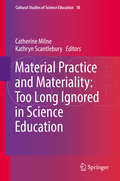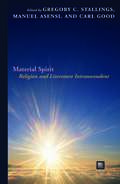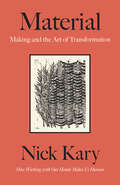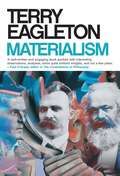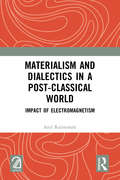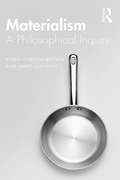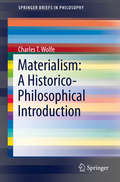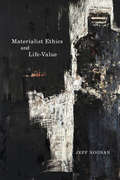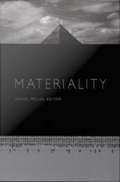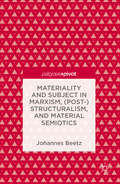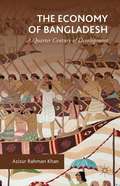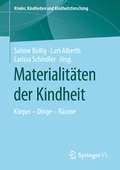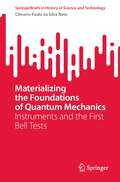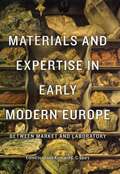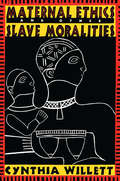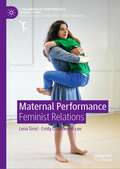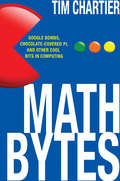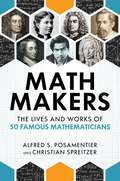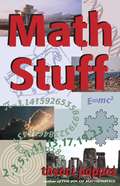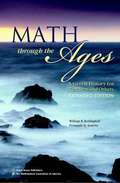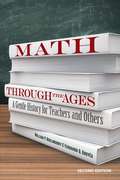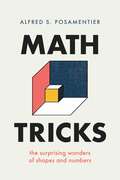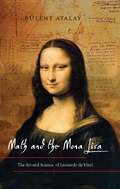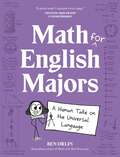- Table View
- List View
Material Practice and Materiality: Too Long Ignored in Science Education (Cultural Studies of Science Education #18)
by Kathryn Scantlebury Catherine MilneIn this book various scholars explore the material in science and science education and its role in scientific practice, such as those practices that are key to the curriculum focuses of science education programs in a number of countries.As a construct, culture can be understood as material and social practice. This definition is useful for informing researchers' nuanced explorations of the nature of science and inclusive decisions about the practice of science education (Sewell, 1999). As fields of material social practice and worlds of meaning, cultures are contradictory, contested, and weakly bounded. The notion of culture as material social practices leads researchers to accept that material practice is as important as conceptual development (social practice).However, in education and science education there is a tendency to ignore material practice and to focus on social practice with language as the arbiter of such social practice. Often material practice, such as those associated with scientific instruments and other apparatus, is ignored with instruments understood as "inscription devices", conduits for language rather than sources of material culture in which scientists share “material other than words” (Baird, 2004, p. 7) when they communicate new knowledge and realities. While we do not ignore the role of language in science, we agree with Barad (2003) that perhaps language has too much power and with that power there seems a concomitant loss of interest in exploring how matter and machines (instruments) contribute to both ontology and epistemology in science and science education.
Material Spirit: Religion and Literature Intranscendent (Perspectives in Continental Philosophy)
by Manuel Asensi Carl GoodThe essays in this collection examine philosophical, religious, and literary or artistic texts using methodologies and insights that have grown out of reflection on literature and art. In them, them phrase “material spirit” becomes a point of departure for considering the continuing spectral effects of religious texts and concerns in ways that do not simply call for, or assume, new orrenewed forms of religiosity.The writers in this collection seek to examine religion beyond traditional notions of transcendence: Their topics range from early Christian religious practices to global climate change. Some of the essays explore religious themes or tones in literary texts, for example, works by Wordsworth, Hopkins, Proust, Woolf, and Teresa of Avila. Others approach—in a literarycriticalmood—philosophical or para-philosophical writers such as Bataille, Husserl, Derrida, and Benjamin. Still others treat writers of a more explicitly religious orientation, such as Augustine, Rosenzweig, or Bernard of Clairvaux.
Material: Making and the Art of Transformation
by Nick KaryA master craftsperson explores the ways in which working with our hands reveals the essence of both our humanity and our relationship with the natural, material world In our present age of computer-assisted design, mass production and machine precision, the traditional skills of the maker or craftsperson are hard to find. Yet the desire for well-made and beautiful objects from the hands (and mind) of a skilled artisan is just as present today as it ever has been. Whether the medium they work with is wood, metal, clay or something else, traditional makers are living links to the rich vein of knowledge and skills that defines our common human heritage. More than this, though, many of us harbor a deep and secret yearning to produce something – to build or shape, to imagine and create our own objects that are imbued not only with beauty and functionality, but with a story and, in essence, a spirit drawn from us. Nick Kary understands this yearning. For nearly four decades he has worked on commission to make fine, distinctive furniture and cabinets from wood, most of it sourced near his home, in the counties of South West England. During this time, he has been both a teacher and a student; one who is fascinated with the philosophy and practice of craft work of all kinds. In Material, Kary takes readers along with him to visit some of the places where modern artisans are preserving, and in some cases passing on, the old craft skills. His vivid descriptions and eye for detail make this book a rich and delightful read, and the natural and cultural history he imparts along the way provides an important context for understanding our own past and the roots of our industrial society. Personal, engaging, and filled with memorable people, landscapes and scenes, Material is a rich celebration of what it means to imagine and create, which in the end is the essence of being human, and native to a place. As Kary puts it, “Wood and words, trees and people, material and ethereal – it is here I love increasingly to dwell.”
Materialism
by Terry EagletonA brilliant introduction to the philosophical concept of materialism and its relevance to contemporary science and culture In this eye-opening, intellectually stimulating appreciation of a fascinating school of philosophy, Terry Eagleton makes a powerful argument that materialism is at the center of today's important scientific and cultural as well as philosophical debates. The author reveals entirely fresh ways of considering the values and beliefs of three very different materialists--Marx, Nietzsche, and Wittgenstein--drawing striking comparisons between their philosophies while reflecting on a wide array of topics, from ideology and history to language, ethics, and the aesthetic. Cogently demonstrating how it is our bodies and corporeal activity that make thought and consciousness possible, Eagleton's book is a valuable exposition on philosophic thought that strikes to the heart of how we think about ourselves and live in the world.
Materialism and Dialectics in a Post-classical World: Impact of Electromagnetism
by Anil RajimwaleEvolution of the concepts of atom and atomism, and the impact of electromagnetism on our worldview, is the object of our study in this book. Electromagnetism is the key link in the transition from classical to post-classical worldview. This transition is caused by the one from our thought based upon the tangibles to that based upon the intangibles. Electromagnetism inaugrated an era of light speeds and near it, and of the world constituted by such speeds. Philosophy and the worldview need to catch up and undergo a basic change. Atom as a concept and reality is under severe stress as explanation of reality. Reality has come out of atomic limits and unveiled a new world, which is constituted of quantum, relativity, wave/particle duality, etc. It is a challenge to philosophy, which re-fashioning to interpret the post-classical world based on rapid motions.We need to develop new concepts and bring about a realignment in various thought constituents. Rather thatn 'overthrow' matter, we are delving deeper into it. Philosophy and human thought itself stands on the brink of redefinition. In the present book the author shows how electromagnetism connects classical with post-classical thought, creating new structures, and impacting materialism and dialectics. Please note: Taylor & Francis does not sell or distribute the Hardback in India, Pakistan, Nepal, Bhutan, Bangladesh and Sri Lanka.
Materialism: A Historical and Philosophical Inquiry
by James Ladyman Robin Gordon BrownThe doctrine of materialism is one of the most controversial in the history of ideas. For much of its history it has been aligned with toleration and enlightened thinking, but it has also aroused strong, often violent, passions amongst both its opponents and proponents. This book explores the development of materialism in an engaging and thought-provoking way and defends the form it takes in the twenty-first century. Opening with an account of the ideas of some of the most important thinkers in the materialist tradition, including Epicurus, Lucretius, Hobbes, Hume, Darwin and Marx, the authors discuss materialism’s origins, as an early form of naturalistic explanation and as an intellectual outlook about life and the world in general. They explain how materialism’s beginnings as an imaginative vision of the true nature of things faced a major challenge from the physics it did so much to facilitate, which now portrays the microscopic world in a way incompatible with traditional materialism. Brown and Ladyman explain how out of this challenge materialism developed into the new doctrine of physicalism. Drawing on a wide range of colourful examples, the authors argue that although materialism does not have all the answers, its humanism and commitment to naturalistic explanation and the scientific method is our best philosophical hope in the ideological maelstrom of the modern world.
Materialism: A Historico-Philosophical Introduction
by Charles T. WolfeThis book provides an overview of key features of (philosophical) materialism, in historical perspective. It is, thus, a study in the history and philosophy of materialism, with a particular focus on the early modern and Enlightenment periods, leading into the 19th and 20th centuries. For it was in the 18th century that the word was first used by a philosopher (La Mettrie) to refer to himself. Prior to that, 'materialism' was a pejorative term, used for wicked thinkers, as a near-synonym to 'atheist', 'Spinozist' or the delightful 'Hobbist'. The book provides the different forms of materialism, particularly distinguished into claims about the material nature of the world and about the material nature of the mind, and then focus on materialist approaches to body and embodiment, selfhood, ethics, laws of nature, reductionism and determinism, and overall, its relationship to science. For materialism is often understood as a kind of philosophical facilitator of the sciences, and the author want to suggest that is not always the case. Materialism takes on different forms and guises in different historical, ideological and scientific contexts as well, and the author wants to do justice to that diversity. Figures discussed include Lucretius, Hobbes, Gassendi, Spinoza, Toland, Collins, La Mettrie, Diderot, d'Holbach and Priestley; Büchner, Bergson, J. J. C. Smart and D. M. Armstrong.
Materialist Ethics and Life-Value
by Jeff NoonanCurrent patterns of global economic activity are not only unsustainable, but unethical - this claim is central to Materialist Ethics and Life-Value. Grounding the definition of ethical value in the natural and social requirements of life-support and life-development shared by all human beings, Jeff Noonan provides a new way of understanding the universal conception of "the good life." Noonan argues that the true crisis affecting the world today is not sluggish rates of economic growth but the model of measuring economic and social health in terms of money-value. In response, he develops an alternative understanding of good societies where the breadth and depth of life-activity and enjoyment are dependent on dominant institutions. The more social institutions satisfy the necessary requirements of human life, the more they empower each person to develop and enjoy the capacities that make human life valuable and meaningful. A well-reasoned synthesis of traditional philosophical concerns and contemporary critiques of global capitalism, this book is a forward-looking treatise that defends political struggle and reconsiders what is most important for a happy life.
Materialist Ethics and Life-Value: Materialist Ethics And Life-value (McGill-Queen's Studies in the History of Ideas #56)
by Jeff NoonanCurrent patterns of global economic activity are not only unsustainable, but unethical - this claim is central to Materialist Ethics and Life-Value. Grounding the definition of ethical value in the natural and social requirements of life-support and life-development shared by all human beings, Jeff Noonan provides a new way of understanding the universal conception of "the good life." Noonan argues that the true crisis affecting the world today is not sluggish rates of economic growth but the model of measuring economic and social health in terms of money-value. In response, he develops an alternative understanding of good societies where the breadth and depth of life-activity and enjoyment are dependent on dominant institutions. The more social institutions satisfy the necessary requirements of human life, the more they empower each person to develop and enjoy the capacities that make human life valuable and meaningful. A well-reasoned synthesis of traditional philosophical concerns and contemporary critiques of global capitalism, this book is a forward-looking treatise that defends political struggle and reconsiders what is most important for a happy life.
Materiality
by Daniel MillerThroughout history and across social and cultural contexts, most systems of belief--whether religious or secular--have ascribed wisdom to those who see reality as that which transcends the merely material. Yet, as the studies collected here show, the immaterial is not easily separated from the material. Humans are defined, to an extraordinary degree, by their expressions of immaterial ideals through material forms. The essays in Materiality explore varied manifestations of materiality from ancient times to the present. In assessing the fundamental role of materiality in shaping humanity, they signal the need to decenter the social within social anthropology in order to make room for the material. Considering topics as diverse as theology, technology, finance, and art, the contributors--most of whom are anthropologists--examine the many different ways in which materiality has been understood and the consequences of these differences. Their case studies show that the latest forms of financial trading instruments can be compared with the oldest ideals of ancient Egypt, that the promise of software can be compared with an age-old desire for an unmediated relationship to divinity. Whether focusing on the theology of Islamic banking, Australian Aboriginal art, derivatives trading in Japan, or textiles that respond directly to their environment, each essay adds depth and nuance to the project that Materiality advances: a profound acknowledgment and rethinking of one of the basic properties of being human. Contributors. Matthew Engelke, Webb Keane, Susanne Kchler, Bill Maurer, Lynn Meskell, Daniel Miller, Hirokazu Miyazaki, Fred Myers, Christopher Pinney, Michael Rowlands, Nigel Thrift
Materiality and Subject in Marxism, (Post-)Structuralism, and Material Semiotics
by Johannes BeetzThis clear and concise book investigates the relation between materiality and the subject in Marxism, (post-)structuralism, and material semiotics. It introduces the three approaches in an accessible way and serves as an introduction to different kinds of materialism and theories of the subject. For each approach, the modalities of materiality of the respective materialism are defined and the relationship between these multiple materialities and the subject are presented as specific to the theoretical approaches discussed. Beetz argues for a non-reductionist materialism, which conceives of materiality as more than matter or matter in motion. In such a materialism the subject is seen as an effect of material conditions, relations, processes, and practices. He shows how the constitution and decentering of the subject is conceptualized in the approaches presented and highlights the role of material instances in these processes.
Materiality, Rules and Regulation: New Trends in Management and Organization Studies (Technology, Work and Globalization)
by Nathalie Mitev François-Xavier de Vaujany Anouk Mukherjee Giovan LanzaraMateriality, Rules and Regulation: New Trend in Management and Organization Studies concentrates on the relationship of rules and regulation to the materiality of artefacts, practices, and organizations. It combines the recent scholarly interest on sociomateriality with a focus on regulation and rules.
Materialitäten der Kindheit: Körper – Dinge – Räume (Kinder, Kindheiten und Kindheitsforschung #22)
by Larissa Schindler Lars Alberth Sabine BolligDer Band fasst aktuelle Theorieperspektiven und Forschungsbefunde zur Bedeutung von Körpern, Objekten und Räumen in der interdisziplinären Kindheitsforschung zusammen. Es wird gezeigt, in welchem Maße diese Materialitäten daran mitwirken, dass sich bestimmte gesellschaftliche Kindheitsmuster und -erfahrungen ausbilden und wie material die Positionierungs- und Subjektivierungsprozesse von Kindern als Kinder gedacht werden müssen.
Materializing the Foundations of Quantum Mechanics: Instruments and the First Bell Tests (SpringerBriefs in History of Science and Technology)
by Climério Paulo da Silva NetoThis book offers a history of the instrumentation used to materialize the early thought experiments devised in the Einstein-Bohr disputes over the foundations of quantum mechanics. It shows how the second world war and cold war fostered the development of materials, instruments, and systems that made it possible to create, manipulate, and detect single quantum systems, thus creating the material conditions for experiments in foundations of quantum mechanics and for a broad spectrum of experimental inquiries on the structure and properties of matter which underlay the creation of new research fields such as quantum optics, quantum information, and atomic, molecular, and optical physics. Discussing research and development performed in diverse contexts, this book reveals how physicists carried instruments, and the knowledge they embodied, through disciplinary and geographic frontiers to probe entanglement, a most intriguing feature of the quantum world.
Materials and Expertise in Early Modern Europe: Between Market and Laboratory
by Ursula Klein E. C. SparyIt is often assumed that natural philosophy was the forerunner of early modern natural sciences. But where did these sciences' systematic observation and experimentation get their starts? In Materials and Expertise in Early Modern Europe, the laboratories, workshops, and marketplaces emerge as arenas where hands-on experience united with higher learning. In an age when chemistry, mineralogy, geology, and botany intersected with mining, metallurgy, pharmacy, and gardening, materials were objects that crossed disciplines. Here, the contributors tell the stories of metals, clay, gunpowder, pigments, and foods, and thereby demonstrate the innovative practices of technical experts, the development of the consumer market, and the formation of the observational and experimental sciences in the early modern period. Materials and Expertise in Early Modern Europe showcases a broad variety of forms of knowledge, from ineffable bodily skills and technical competence to articulated know-how and connoisseurship, from methods of measuring, data gathering, and classification to analytical and theoretical knowledge. By exploring the hybrid expertise involved in the making, consumption, and promotion of various materials, and the fluid boundaries they traversed, the book offers an original perspective on important issues in the history of science, medicine, and technology.
Maternal Ethics and Other Slave Moralities
by Cynthia WillettIn Maternal Ethics and Other Slave Moralities which includes the first extended philosophical discussion of the works of Frederick Douglass, Cynthia Willett puts forward a novel theory of ethical subjectivity that is aimed to counter prevailing pathologies of sexist, racist Eurocentric culture. Weaving together accounts of the self drawn from African-American and European philosophies, psychoanalysis, slave narratives and sociology, Willett interrogates what Hegel locates as the core of the self: the desire for
Maternal Performance: Feminist Relations (Contemporary Performance InterActions)
by Lena Šimić Emily Underwood-LeeMaternal Performance: Feminist Relations bridges the fields of performance, feminism, maternal studies, and ethics. It loosely follows the life course with chapters on maternal loss, pregnancy, birth, aftermath, maintenance, generations, and futures. Performance and the maternal have an affinity as both are lived through the body of the mother/artist, are played out in real time, and are concerned with creating ethical relationships with an other – be that other the child, the theatrical audience, or our wider communities. The authors contend that maternal performance takes the largely hidden, private and domestic work of mothering and makes it worthy of consideration and contemplation within the public sphere.
Math Bytes: Google Bombs, Chocolate-Covered Pi, and Other Cool Bits in Computing
by Tim P. ChartierAn inviting collection of fun, hands-on applications in mathematics and computingThis book provides a fun, hands-on approach to learning how mathematics and computing relate to the world around us and help us to better understand it. How can reposting on Twitter kill a movie's opening weekend? How can you use mathematics to find your celebrity look-alike? What is Homer Simpson’s method for disproving Fermat’s Last Theorem? Each topic in this refreshingly inviting book illustrates a famous mathematical algorithm or result--such as Google’s PageRank and the traveling salesman problem--and the applications grow more challenging as you progress through the chapters. But don’t worry, helpful solutions are provided each step of the way.Math Bytes shows you how to do calculus using a bag of chocolate chips, and how to prove the Euler characteristic simply by doodling. Generously illustrated in color throughout, this lively and entertaining book also explains how to create fractal landscapes with a roll of the dice, pick a competitive bracket for March Madness, decipher the math that makes it possible to resize a computer font or launch an Angry Bird--and much, much more. All of the applications are presented in an accessible and engaging way, enabling beginners and advanced readers alike to learn and explore at their own pace--a bit and a byte at a time.
Math Makers: The Lives and Works of 50 Famous Mathematicians
by Alfred S. Posamentier Christian SpreitzerAn entertaining history of mathematics as chronicled through fifty short biographies. Mathematics today is the fruit of centuries of brilliant insights by men and women whose personalities and life experiences were often as extraordinary as their mathematical achievements. This entertaining history of mathematics chronicles those achievements through fifty short biographies that bring these great thinkers to life while making their contributions understandable to readers with little math background. Among the fascinating characters profiled are Isaac Newton (1642-1727), the founder of classical physics and infinitesimal calculus—he frequently quarreled with fellow scientists and was obsessed by alchemy and arcane Bible interpretation; Sophie Germain (1776 - 1831), who studied secretly at the Ecole Polytechnique in Paris, using the name of a previously enrolled male student—she is remembered for her work on Fermat's Last Theorem and on elasticity theory; Emmy Noether (1882 - 1935), whom Albert Einstein described as the most important woman in the history of mathematics—she made important contributions to abstract algebra and in physics she clarified the connection between conservation laws and symmetry; and Srinivasa Ramanujan (1887-1920), who came from humble origins in India and had almost no formal training, yet made substantial contributions to mathematical analysis, number theory, infinite series, and continued fractions. The unusual behavior and life circumstances of these and many other intriguing personalities make for fascinating reading and a highly enjoyable introduction to mathematics.
Math Stuff
by Theoni PappasWhether it's stuff in your kitchen or garden, stuff that powers your car or your body, stuff that helps you work, communicate or play, or stuff that you've never heard of you can bet that mathematics is there.MATH STUFF brings it all in the open in the Pappas style.Not many people think of mathematics as fascinating, exciting and invaluable. Yet Pappas writes about math ideas in such a way that conveys its often overlooked fascination, excitement, and worth. MATH STUFF deals with 38 topics in an non-threatening way that piques our curiosities. Open the book at random, and learn about such topics as: what a holyhedron is, how computers get stressed, how e-paper will work, how codes and numbers work with our bodies.By the end of this book you will think "Mathematics is the stuff that dreams are made of."
Math Through the Ages: A Gentle History for Teachers and Others
by William P. Berlinghoff Fernando Q. GouvêaWhere did maths come from? Who thought up all those algebra symbols, and why? What's the story behind ... negative numbers? ... the metric system? ... quadratic equations? ... sine and cosine? The 25 independent sketches in Math through the Ages answer these questions and many others in an informal, easygoing style that's accessible to teachers, students, and anyone who is curious about the history of mathematical ideas. Each sketch contains Questions and Projects to help you learn more about its topic and to see how its main ideas fit into the bigger picture of history. The 25 short stories are preceded by a 56-page bird's-eye overview of the entire panorama of mathematical history, a whirlwind tour of the most important people, events, and trends that shaped the mathematics we know today. Reading suggestions after each sketch provide starting points for readers who want to pursue a topic further.
Math Through the Ages: A Gentle History for Teachers and Others (Dover Books on Mathematics)
by William P. Berlinghoff Fernando Q. Gouvea"This is a beautiful, important book, a pleasure to read, in which the history recounted truly illuminates the mathematical ideas, and the ideas themselves are superbly explained; a wonderful accomplishment." — Barry Mazur, Harvard University"Math Through the Ages is a treasure, one of the best history of math books at its level ever written. Somehow, it manages to stay true to a surprisingly sophisticated story, while respecting the needs of its audience. Its overview of the subject captures most of what one needs to know, and the 30 sketches are small gems of exposition that stimulate further exploration." — Glen Van Brummelen, Quest University Designed for students just beginning their study of the discipline, this concise introductory history of mathematics is supplemented by brief but in-depth sketches of the more important individual topics. Covering such subjects as algebra symbols, negative numbers, the metric system, quadratic equations, and much more, this widely adopted work invites and encourages further study of mathematics.
Math Tricks: The Surprising Wonders of Shapes and Numbers
by Alfred S. PosamentierIt is no secret that most people avoid mathematics, in large measure because elementary school teachers have never done much to motivate a love of the subject matter. In his latest book, mathematician Alfred S. Posamentier provides easily understandable, easily presentable and easily replicated tricks that one can do with mathematics. All that is required is the ability to do arithmetic, understand the very basics of algebra and geometry and have an open mind for probability. From geometrical puzzles to numerical quirks, Math Tricks will give readers that "aha!" moment they may never have received at school.
Math and the Mona Lisa: The Art and Science of Leonardo da Vinci
by Bulent AtalayLeonardo da Vinci was one of history's true geniuses, equally brilliant as an artist, scientist, and mathematician. Readers of The Da Vinci Code were given a glimpse of the mysterious connections between math, science, and Leonardo's art. Math and the Mona Lisa picks up where The Da Vinci Code left off, illuminating Leonardo's life and work to uncover connections that, until now, have been known only to scholars. Bülent Atalay, a distinguished scientist and artist, examines the science and mathematics that underlie Leonardo's work, paying special attention to the proportions, patterns, shapes, and symmetries that scientists and mathematicians have also identified in nature. Following Leonardo's own unique model, Atalay searches for the internal dynamics of art and science, revealing to us the deep unity of the two cultures. He provides a broad overview of the development of science from the dawn of civilization to today's quantum mechanics. From this base of information, Atalay offers a fascinating view into Leonardo's restless intellect and modus operandi, allowing us to see the source of his ideas and to appreciate his art from a new perspective.From the Hardcover edition.
Math for English Majors: A Human Take on the Universal Language
by Ben OrlinIn this trailblazing work from the internet&’s most empathetic math teacher, Ben Orlin unravels the secrets behind the world&’s most confounding language. Math, it is said, is the "universal language.&” But if a language brings people together, why does math make so many of us feel so alone? In Math for English Majors, bestselling author Ben Orlin (Math with Bad Drawings) offers fresh insights for the mathematically perplexed and mathematical masters alike. As Orlin reveals, the &“universal language&” is precisely that: a language. It has nouns (numbers), verbs (calculations), and grammar (algebra). It has funny idioms (&“exponential&”), quirky etymologies (&“squaring&”), and peculiar ambiguities (&“PEMDAS&”). It even has its own form of literature, with equations ranging from the simple wisdom of A2 + B2 = C2 to the startling profundity of eπi + 1 = 0. Along the way, he shares relatable stories of his own mathematical misunderstandings and epiphanies, as well as the trials and triumphs of his students. And, as always, he sheds further light and levity on the subject with his inept—yet strangely effective—drawings.
